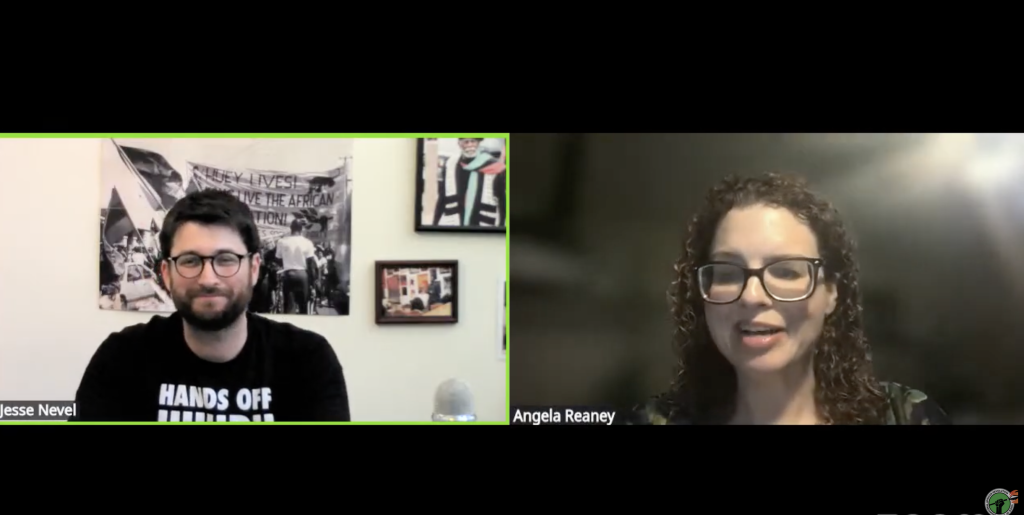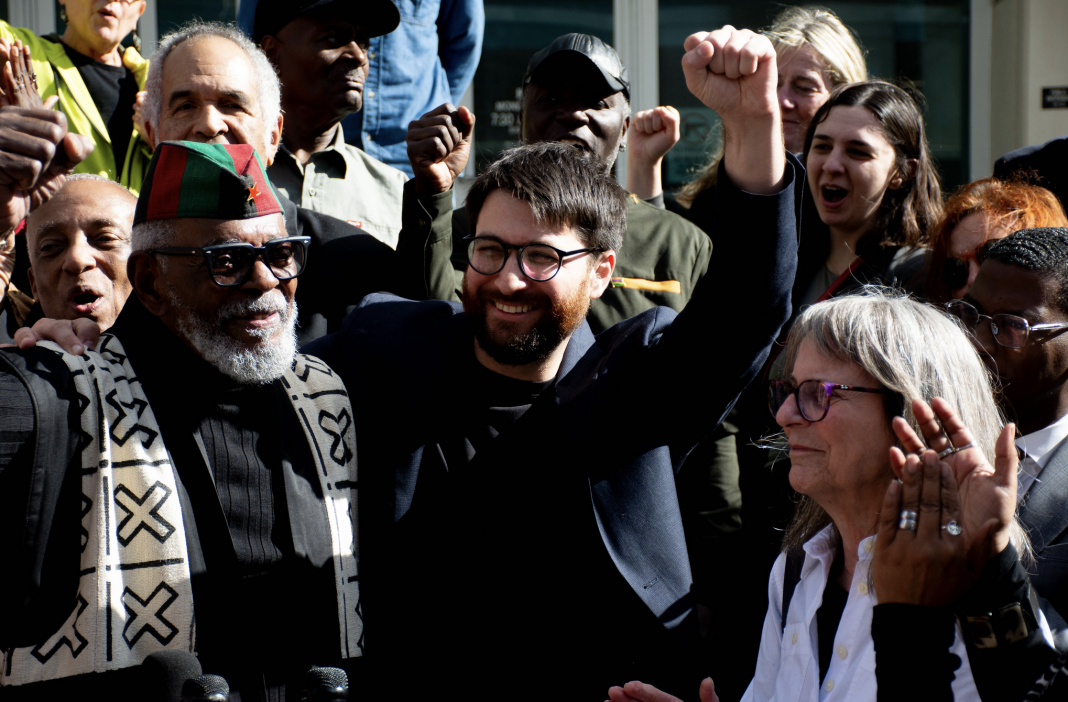This is a condensed conversation between Jesse Nevel, Chair of the Uhuru Solidarity Movement and one of the Uhuru 3, and Attorney Angela Reaney, one of the lawyers who defended the Uhuru 3 on the anti-colonial free speech trial of the century in December 2024. The full discussion is part of a Hands Off Uhuru webinar that aired on June 21 and is available on The Burning Spear TV YouTube channel.
Jesse Nevel: We salute the leadership of Chairman Omali Yeshitela and the Uhuru Movement, Deputy Chair Ona Zené Yeshitela. Every victory that has come since the July 29th, 2022 raids on the Uhuru Movement was made possible by the anti-colonial free speech movement that was built under the banner of “Hands Off Uhuru! Hands Off Africa!” Following the raids, the Party launched a counter-offensive to advance the long struggle that goes back decades and centuries of African people fighting for self-determination and resisting colonial state repression. We’re joined today by Angela Reaney, one of our brilliant attorneys who played an instrumental role in preparing and carrying out the counter-offensive on the legal front during the free speech trial of the century. Angela is also one of the co-authors of this appeal, along with Leonard Goodman, Ade Griffin, Mutaqee Akbar, and Tom Inskeep.
This appeal is bigger than just getting a conviction overturned. Its aim is to set a landmark precedent in the fight for freedom of speech. As the Chairman has pointed out, when the First Amendment was written in 1791, African people were enslaved. Who else but African people, who never had free speech rights in this country to begin with, would be at the vanguard of the fight for free speech? This is part of what gives the Uhuru 3 fight-back so much significance, including this appeal brief. This will also be another victory in the larger struggle by Hands Off Uhuru to campaign for the abolition of the unjust, anti-democratic, repressive “foreign agents” and “conspiracy” laws that have been used repeatedly by the U.S. government to silence, harass and imprison African and other colonized peoples who exercise free speech to organize for their liberation.
The appeal was filed on June 16. Here it is—55 pages—you can read it on HandsOffUhuru.org. It lays out every argument, starting with the key question of freedom of speech: the indictment itself should have been dismissed from the beginning based on the protection of speech that is supposed to be afforded by the First Amendment.

Angela Reaney: Uhuru! Yes, we did file this appeal on Monday. It’s very exciting. The main issue that we raised is about the First Amendment. All of the conduct that the government was mad about involved political speech, which is protected under the First Amendment. And the way they got around that in the district court is they tried to say, “Well, we are saying you did it at the behest of Russia, so therefore it’s not speech anymore.”
So that’s the issue that we’re raising. It’s clear that the First Amendment covers this speech, and we’re arguing that no, this is the same protected speech that they’ve engaged in for decades, and it doesn’t lose its protection here. There’s no case in the history of the United States that has held that political speech can turn into an act.
We have a huge opportunity to set really good precedent in this appeal. In the federal system, the appeals courts are divided into different circuits. Down in Florida, we’re in the 11th Circuit—so that’s up in Atlanta, Georgia. If we get a favorable ruling in this case, it means all of the states in the 11th Circuit would have to follow that opinion. They couldn’t prosecute any other activists like the Middle District of Florida did here for political speech. That would be huge.
There’s not really another case that’s addressed this. So the other circuits would look at this and likely follow it if we were to win this on appeal. That would be huge because we don’t want to see the government start targeting other activist groups for speech just because they’re allegedly cooperating with another government. It’s clearly a First Amendment right that we’re able to associate and speak how we want to, and that’s protected.
So we want to make sure to set that precedent so we’ll cover everybody that way—all other groups—they won’t have that fear. I’m sure this indictment has chilled free speech. I’m sure other organizations have thought twice about their associations and how they want to move forward. And that shouldn’t happen, and we want to change that.
JN: The Chairman has always said that the attack on the Uhuru Movement was “the canary in the coal mine.” This attack on the Uhuru Movement was unleashed under the Biden administration, the Democrats. This attack set the foundation for the ongoing intensification of attacks on anti-colonial free speech that have continued to escalate under the current administration. We’ve seen students—Palestinians and other Arab students and African students—being deported or being detained without having access to an attorney. We’re seeing the attacks and threats against Union del Barrio and other Mexican organizations by the Senate, by Josh Hawley. It clearly shows that this case continues to be the tip of the spear for the fight for anti-colonial free speech. Its implications are huge for anybody and everybody that cares about free speech.
AR: The government is trying to chip away at the First Amendment, and this is how they’re doing it, which is why it’s so important that we wage this battle with the government over a First Amendment issue.
We did raise some other issues, and we could win on one of these other issues and they may not even address the First Amendment. One of these issues is called “sufficiency of the evidence”—which covers several of our arguments. That means we’re just saying the government didn’t produce the evidence at trial that’s necessary to prove that the Uhuru 3 committed this crime they’re alleging that they did.
The government didn’t produce any evidence that the Uhuru 3 acted at the direction or control of a foreign government. The FBI agents conceded this repeatedly. You’ll see in the appeal brief we’re citing to the agents saying no, they didn’t do this because Russia told them; they did this because this is what they believe in. Even the FBI agents had caught on that these are sincerely held beliefs, and Russia wasn’t influencing that.
They convicted the Uhuru 3 on the conspiracy charge. The jury found that they didn’t actually act at the direction or control in any of the “overt acts” that they alleged in the indictment. The government conceded it’s okay to work with Russia, but you have to register to do it. And there’s this registration requirement that most people don’t even know exists unless you’re in the business of working with other countries at a very high level–not an activist. You don’t know about this requirement.
Well, they didn’t have to prove that they didn’t know, which makes it essentially a strict liability crime, like a traffic ticket. Only with a traffic ticket, you get a fine, right? But here, you could get up to five years in prison on this conspiracy charge.
The other argument related to that is they didn’t prove that the people that you worked with were actually connected to the Russian government.
We had an argument that the jury instructions—the instructions sent back to the jury—were really confusing on this conspiracy charge. That was coupled with the fact that the prosecutor took advantage of that in closing and made it sound like just because the Uhuru 3 worked with Russia, it was a partnership, and that’s all they needed. And that’s clearly not the law. So we’re appealing that.
We shouldn’t have been considered in a conspiracy along with the first defendant in the appeal. And we asked to be tried separately because the acts had nothing to do with the Uhuru 3. They were completely separate.
We do have the prosecutorial misconduct argument—that the government made false accusations, and we’re arguing that such misconduct warrants a reversal.
This is a very long process. There’s nothing fast about an appeal. The government has a due date to file their response to us. They can ask for more time—they’ll probably get more time to file. Then after they file, we get to reply to what they’ve said.
Then we’re going to wait and see if the government and the 11th Circuit grant us oral argument. I think that will be the case, because of the nature of the issues that we’ve raised. They will set a date for us to argue, and that will be in Atlanta at the Court of Appeals.
It’s an exciting appeal. I’m so honored to work on it and work with you all. Thank you.






